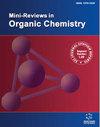Asciminib - ABL Kinase Inhibitor in the Treatment of Philadelphia Chromosome Positive Chronic Myeloid Leukemia: Chemistry and Pharmacology Perspectives
IF 1.9
4区 化学
Q2 CHEMISTRY, ORGANIC
引用次数: 0
Abstract
Abstract: Asciminib, also known as ACP-196, is the FDA-approved low-molecular ABL kinase inhibitor. The ABL kinase is a non-receptor tyrosine kinase that helps in cell growth and survival and is a key player in the development of chronic myeloid leukemia (CML) and Philadelphia chromosome-positive acute lymphoblastic leukemia (Ph+ALL). The BCR-ABL fusion protein, which is formed by chromosomal translocation in CML and Ph+ ALL, results in the constitutive activation of ABL kinase, leading to uncontrolled cell growth and proliferation. To have a high binding affinity for the active site of the enzyme, structural biology and computer-aided drug design (CADD) concepts were applied to the design of asciminib so that it could specifically target the ABL kinase enzyme. The drug was synthesized and characterized in a laboratory. In its pharmacological studies, it has shown that asciminib is a potent and selective inhibitor of ABL kinase. Phase I clinical trials assessed its safety and efficacy, revealing that it is effective against tumors while causing minimal discomfort to patients. In addition to this, it was able to induce apoptosis and a cytogenetic response as well as inhibit the proliferation of CML and Ph+ALL cells in patients with CML. As this trial gave a positive response, phase II and III trials were conducted. In that sense, asciminib has shown to be highly effective, with response rates of over 90% in patients with these diseases. The safety and efficacy of asciminib were also evaluated in combination with other drugs, such as tyrosine kinase inhibitors and immunomodulatory drugs, and the results were promising. Overall, the discovery and development of asciminib showed that by using the concepts of pharmacology and CADD, a drug with a 90% positive rate response can be developed with a high tolerance level and lower side effects阿西米尼- ABL激酶抑制剂治疗费城染色体阳性慢性髓性白血病:化学和药理学观点
摘要:Asciminib,又称ACP-196,是fda批准的低分子ABL激酶抑制剂。ABL激酶是一种非受体酪氨酸激酶,有助于细胞生长和存活,在慢性髓性白血病(CML)和费城染色体阳性急性淋巴细胞白血病(Ph+ALL)的发展中起关键作用。BCR-ABL融合蛋白在CML和Ph+ ALL中通过染色体易位形成,导致ABL激酶的组成性激活,导致细胞生长和增殖失控。为了对酶的活性位点具有高结合亲和力,我们将结构生物学和计算机辅助药物设计(CADD)的概念应用于阿西米尼的设计,使其能够特异性靶向ABL激酶酶。这种药物是在实验室合成并鉴定的。药理研究表明,阿西米尼是一种有效的选择性ABL激酶抑制剂。I期临床试验评估了它的安全性和有效性,表明它对肿瘤有效,同时对患者的不适最小。除此之外,它还能诱导细胞凋亡和细胞遗传学反应,抑制CML和Ph+ALL细胞在CML患者中的增殖。由于该试验获得了积极的反应,因此进行了II期和III期试验。从这个意义上说,阿西米尼已被证明是非常有效的,在患有这些疾病的患者中,反应率超过90%。阿西米尼与其他药物如酪氨酸激酶抑制剂和免疫调节药物联合使用的安全性和有效性也进行了评价,结果是有希望的。总的来说,阿西米尼的发现和开发表明,利用药理学和CADD的概念,可以开发出一种阳性率为90%、耐受性高、副作用小的药物
本文章由计算机程序翻译,如有差异,请以英文原文为准。
求助全文
约1分钟内获得全文
求助全文
来源期刊
CiteScore
4.50
自引率
4.30%
发文量
116
审稿时长
>12 weeks
期刊介绍:
Mini-Reviews in Organic Chemistry is a peer reviewed journal which publishes original reviews on all areas of organic chemistry including organic synthesis, bioorganic and medicinal chemistry, natural product chemistry, molecular recognition, and physical organic chemistry. The emphasis will be on publishing quality papers very rapidly, without any charges.
The journal encourages submission of reviews on emerging fields of organic chemistry including:
Bioorganic Chemistry
Carbohydrate Chemistry
Chemical Biology
Chemical Process Research
Computational Organic Chemistry
Development of Synthetic Methodologies
Functional Organic Materials
Heterocyclic Chemistry
Macromolecular Chemistry
Natural Products Isolation And Synthesis
New Synthetic Methodology
Organic Reactions
Organocatalysis
Organometallic Chemistry
Theoretical Organic Chemistry
Polymer Chemistry
Stereochemistry
Structural Investigations
Supramolecular Chemistry

 求助内容:
求助内容: 应助结果提醒方式:
应助结果提醒方式:


